Not too long ago, Mike covered Dave Lauck’s excellent replacement fixed sights for revolvers. Normally, we wouldn’t circle back so quickly to the same business with our coverage, but Dave has been so busy churning out new products for revolvers that we had to put another update together for you. It’s obvious that Dave Lauck appreciates the revolver’s continuing viability as a serious use sidearm and his innovative products make them better.
Sights and Stuff
First, a quick update on the sights. While Dave initially focused on making sights for S&Ws, they are now available for Colt and Ruger revolvers as well. If you’ve got a Python, Anaconda, GP100, or Redhawk that needs a rugged set of high-visibility, low-profile sights, look no further than Dave’s shop.
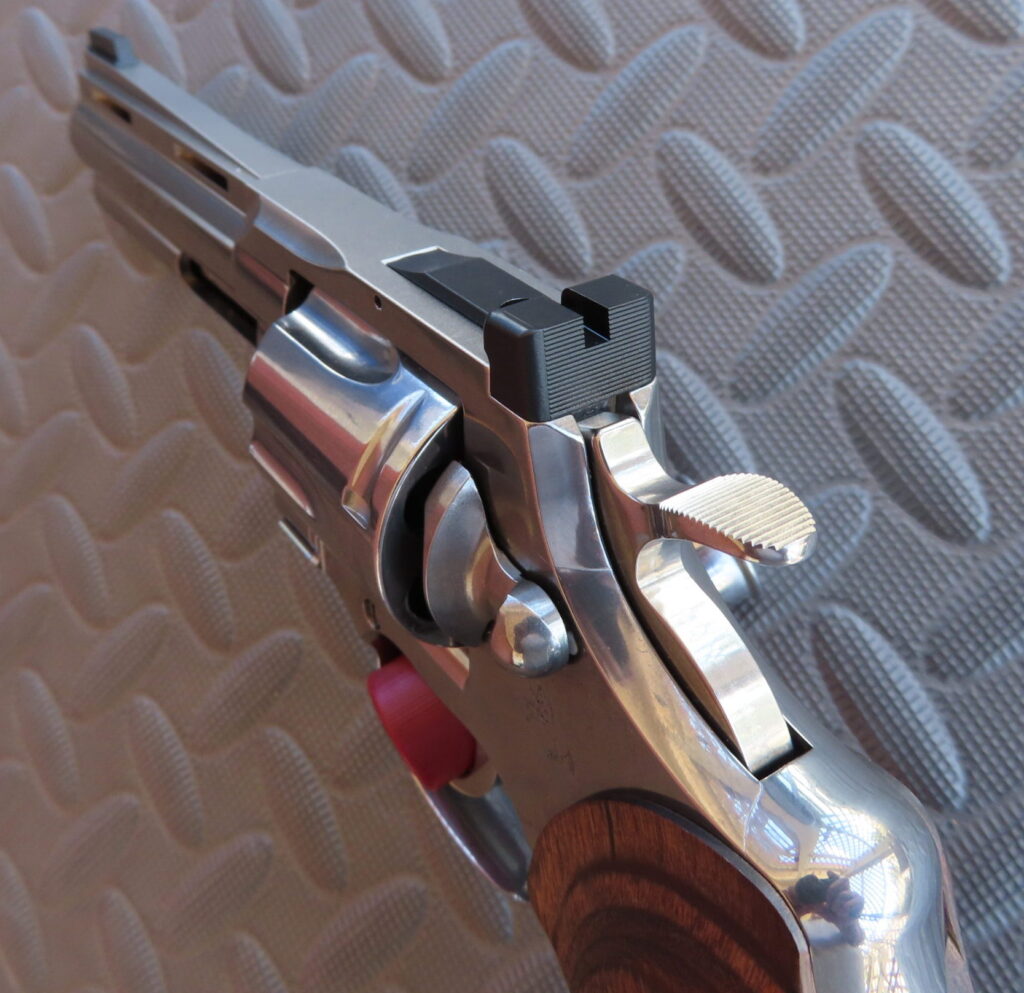
Dave has been hard at work on top strap-mounted, recoil-shouldered, red dot sight mounts, which allow a shooter to use the factory sights when the optic is removed. He has also been working on recessed, dehorned, Picatinny-style light mounts, for revolver barrel underlugs.
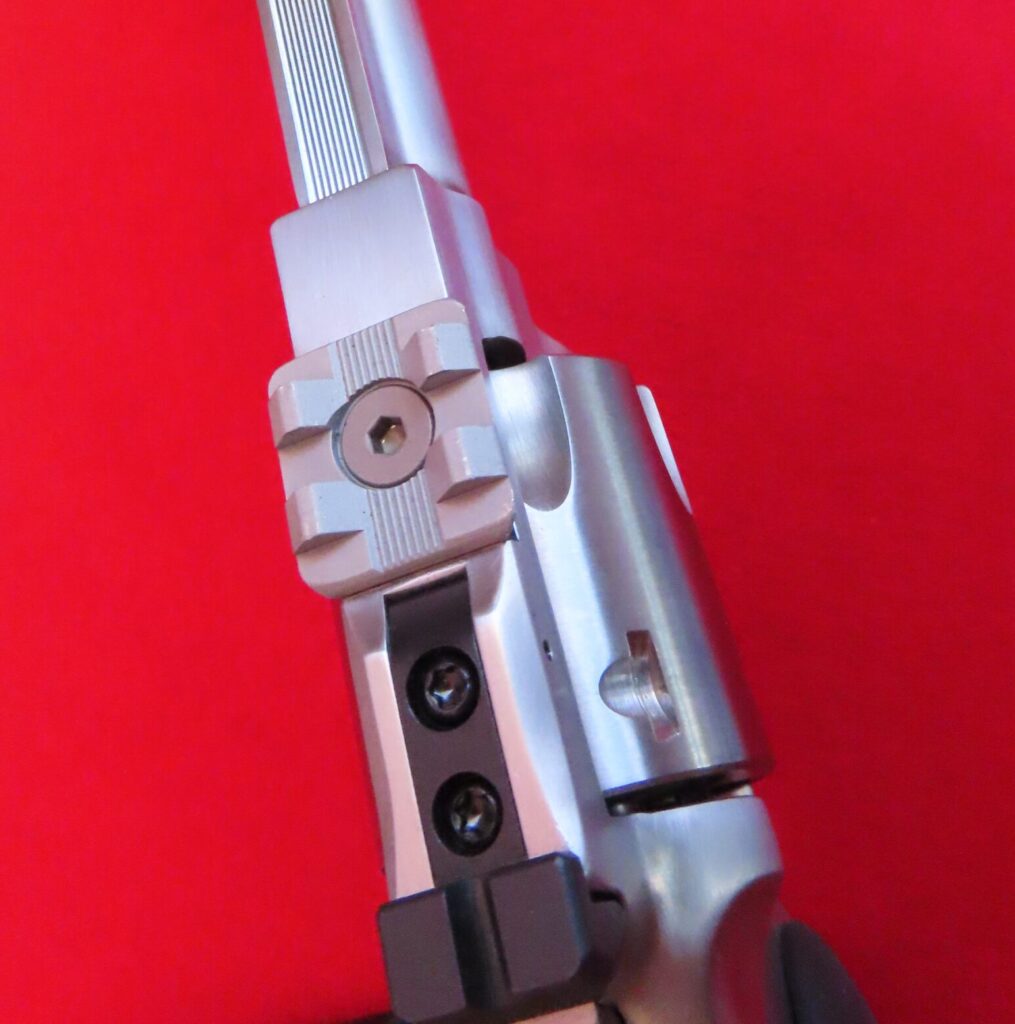
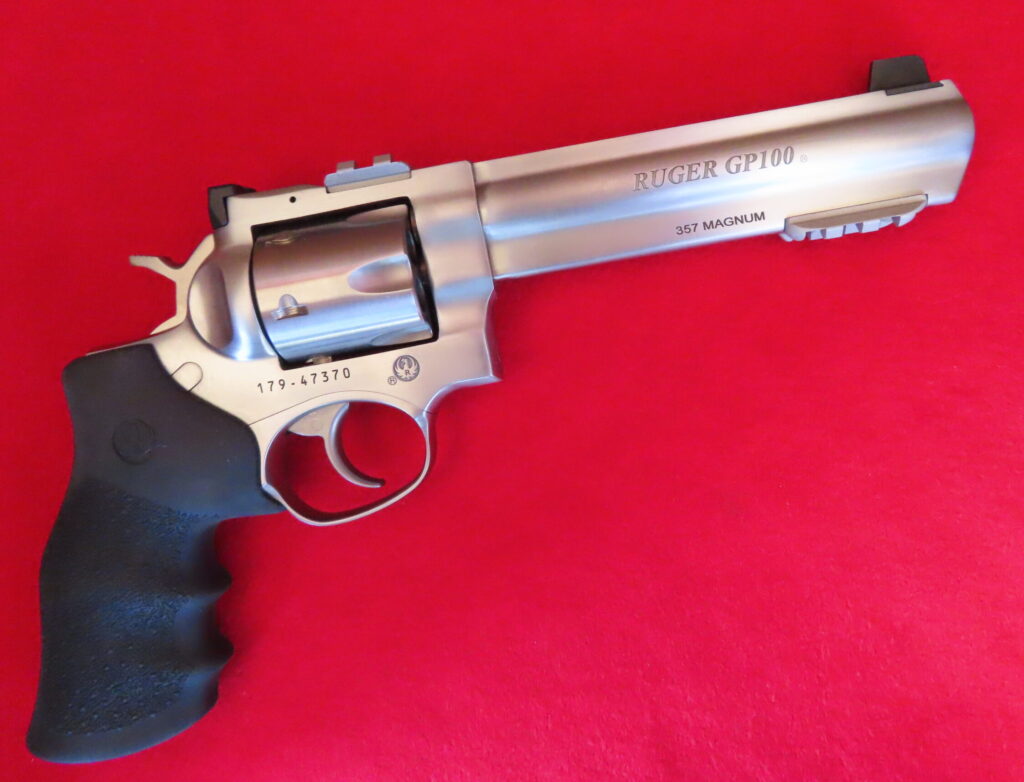
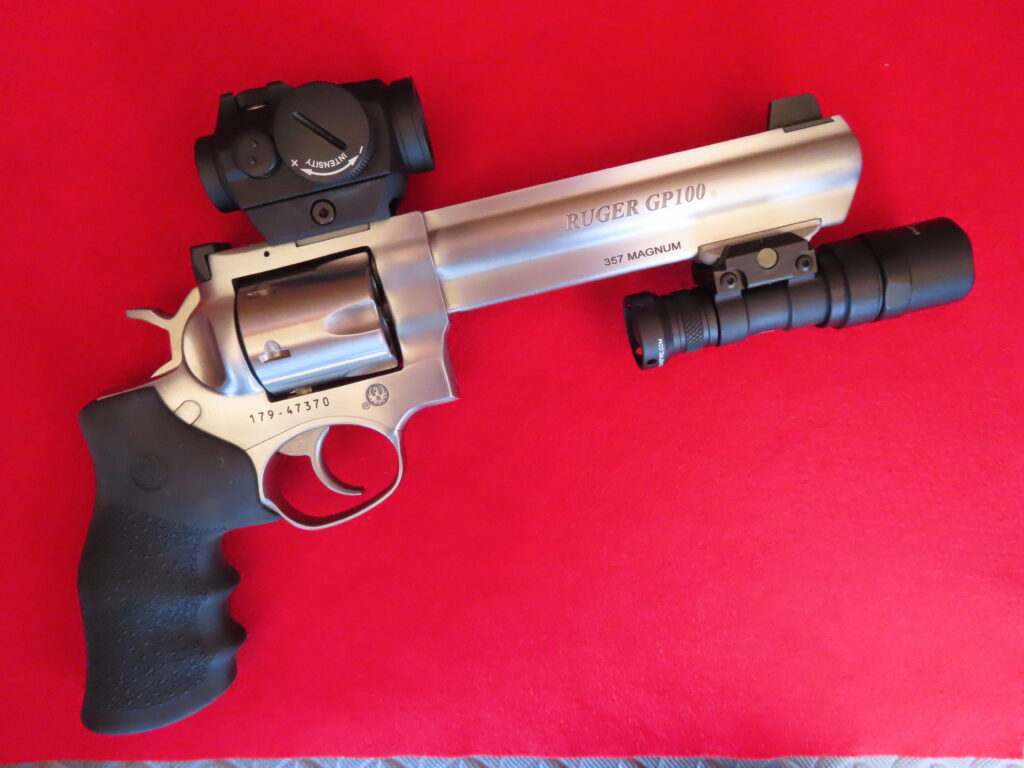
Dave also recently released a very user-friendly thumb piece, and an enhanced cylinder crane stop device for S&W revolvers. We’ll take a closer look at those in the future, after we have a chance to work with them.
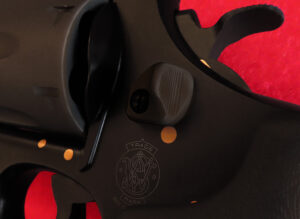
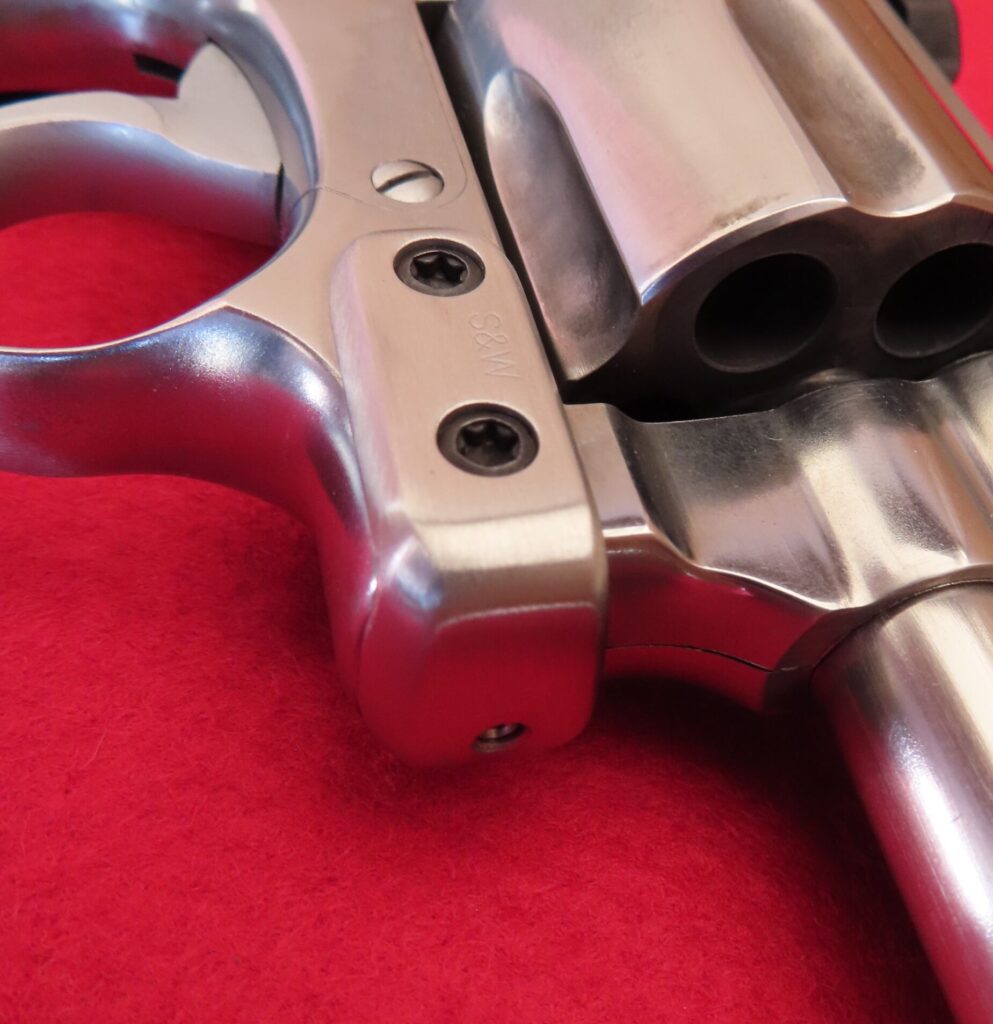
For now, though, let’s focus on two other products that Mike mentioned in his previous coverage, but didn’t review in detail—Dave’s new Performance Revolver Grip, and his Sight Pack optics plate.
Performance Revolver Grips
One of the benefits of carrying a revolver is the ability to select grips/stocks that fit your hand and assist with recoil mitigation. Lauck’s Performance Revolver Grips (PRGs) are a result of Dave’s experience as an end user, and are designed to fix several common problems for users of these guns.
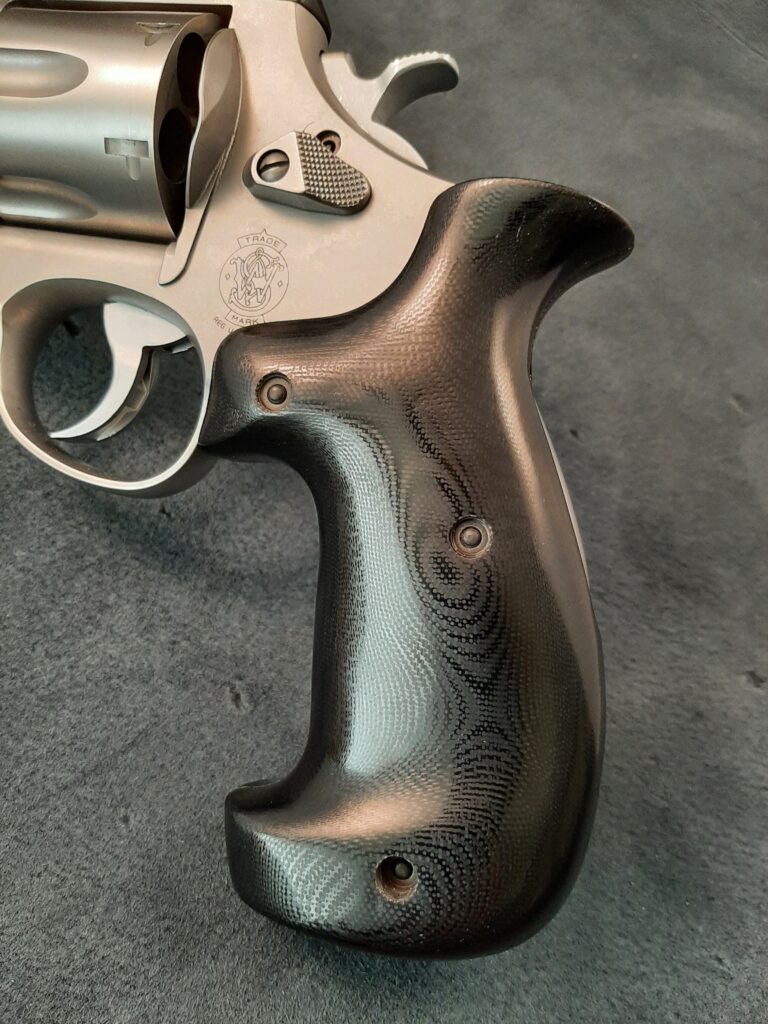
For many, the shape of the S&W grip frame forces the muzzle to rise up when the gun is punched out to a two-handed hold with locked wrists. The hands and wrists then need to roll downward, to align the sights with the target. Dave’s PRG was designed to allow the sights to be “on” target when locking the wrists straight. The design also aids in quick dot acquisition with a rail mounted optic.
Dave fancies the 1911 pistol, which points more naturally than a factory-stocked S&W revolver. He decided to duplicate the grip angle of a 1911 to get revolver sights swiftly on target. It’s impressive that he succeeded in capturing that angle on a round gun.
Equally impressive are the features he designed to keep the shooting hand locked in that position. The handstop at the base of the grip does exactly that; It stops the hand from sliding off the grip. It also helps to keep the gun on target during recoil and minimizes muzzle rise.
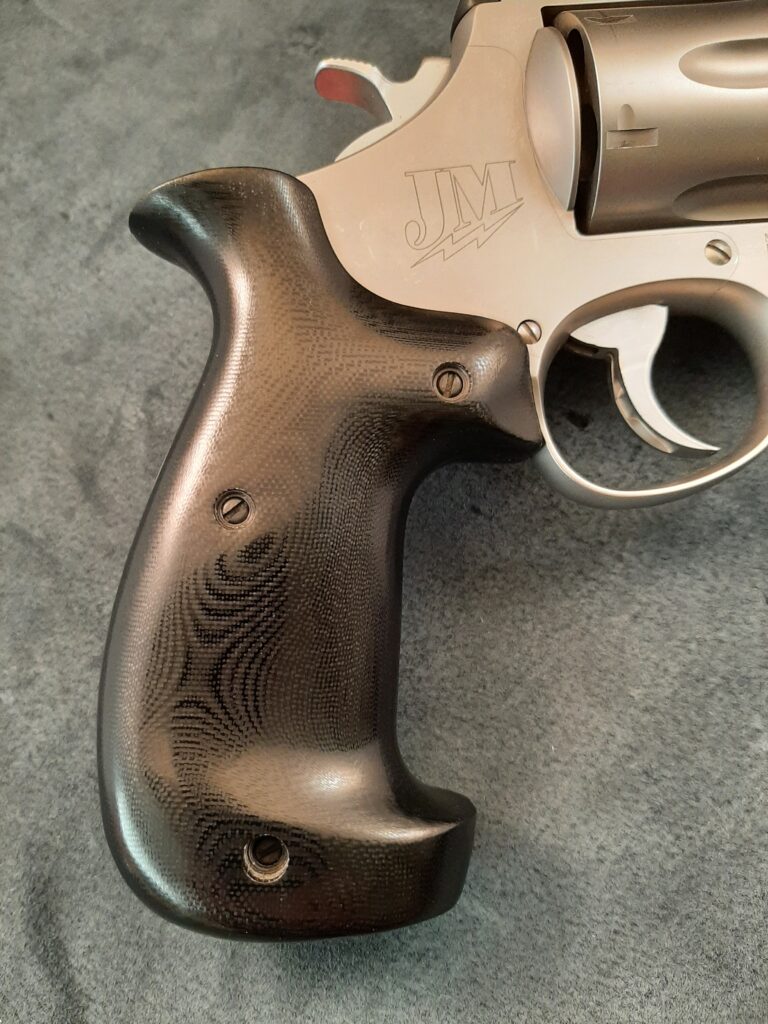
The beavertail is a common feature on semiautos but is almost never seen on revolvers. It allows for a higher grip and puts the hand more in line with the bore which helps with felt recoil and muzzle flip. It also positions the trigger finger for optimal double action trigger leverage. The increased width of the beavertail distributes recoil force over a wider portion of the web of the shooting hand- a welcome feature on hard kicking magnums.
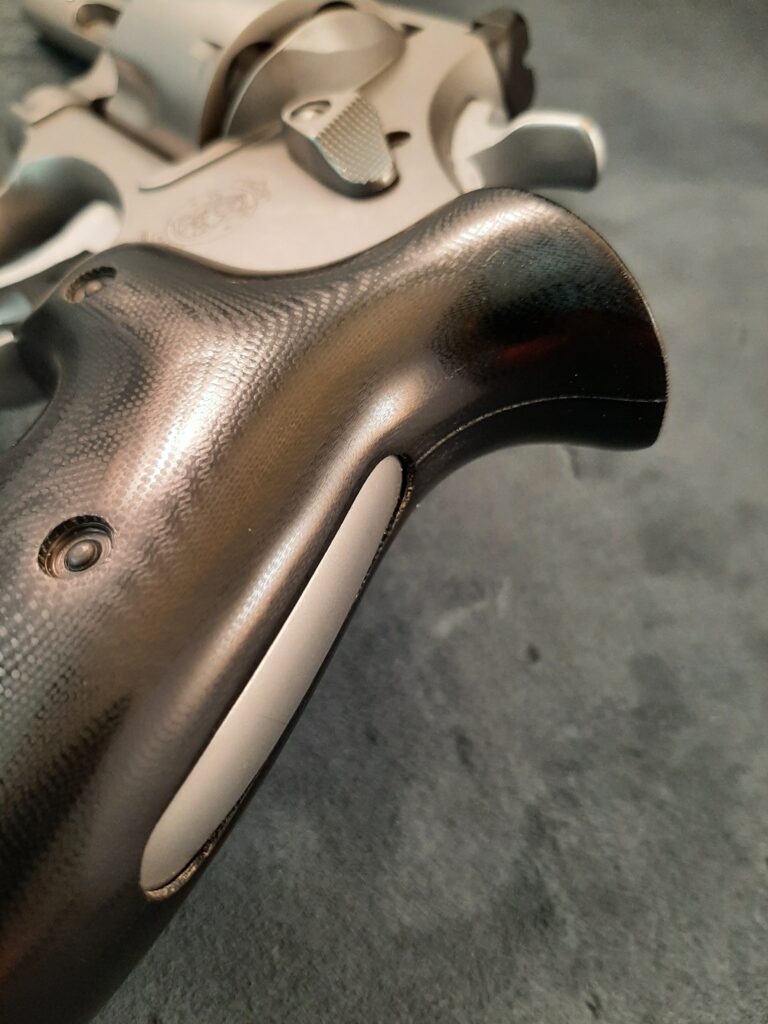
The PRG is a two-piece design that firmly affixes to a round butt grip frame, and is currently made for K, L, N, and X frames. It’s built with two locator pins that join the halves and three cross bolts with standard screw heads that snug them solidly around the frame. Dave partnered with Hogue to construct the grips from heavy duty G-10 for hard use. They’re made slim; Even the N frame versions have less circumference than a single stack 1911 grip. This makes them well suited to average sized hands.
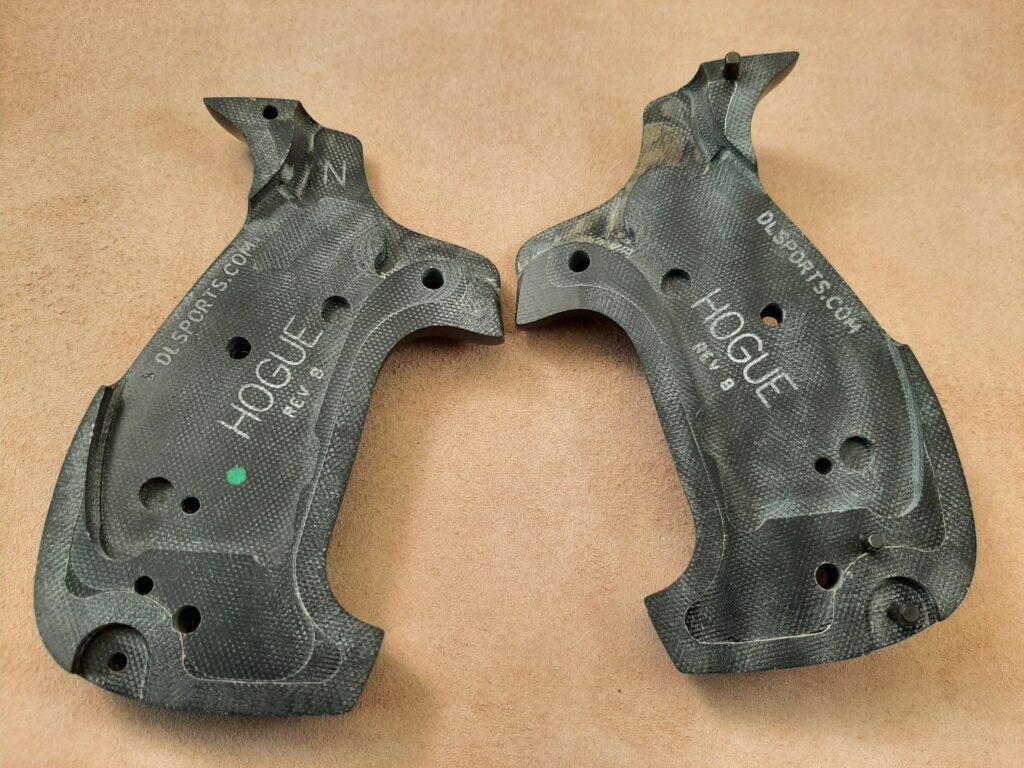
The hand stop at the bottom of the grip can be relieved for larger hands. Lauck will custom fit the grips to your hand size as needed. The G10 exterior is left smooth on purpose, allowing the gun to be shifted for reloads and other gun handling tasks. The panels aren’t sticky or tacky like rubber grips; Clothing slides over them instead of dragging. They can be checkered or stippled as desired, for additional traction. Lauck built a clever lanyard loop into the base that is functional but unobtrusive when not in use.
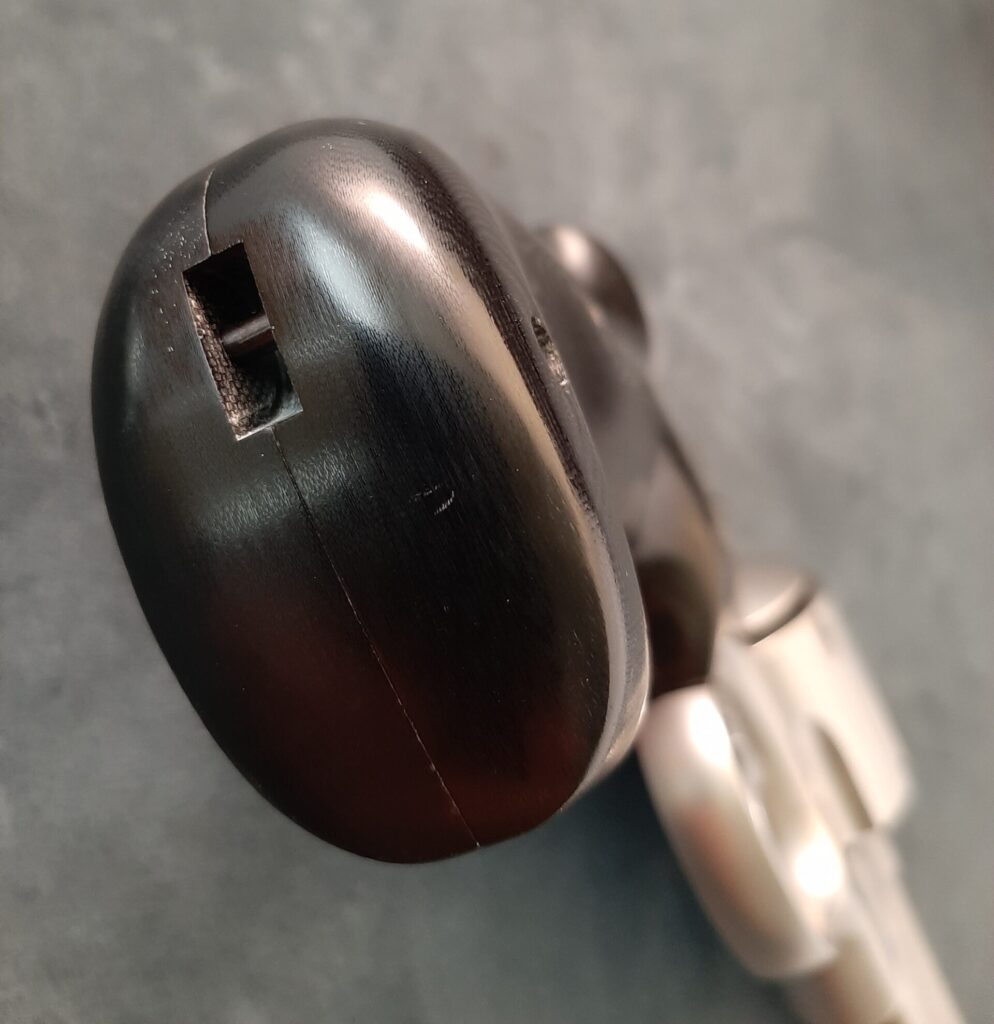
Testing the PRG
Dave offered to send a pair for trial. I asked for an N frame set, and they arrived in short order. I installed them on a 4” barreled, S&W Model 625 .45ACP that already wore D&L Sports sights. While installing them, I had doubts about the smooth exterior texture, thinking it might be too slippery. The fit was excellent and the seams lined up cleanly. The center of the backstrap is left exposed and the grips give a very modern, racy look.
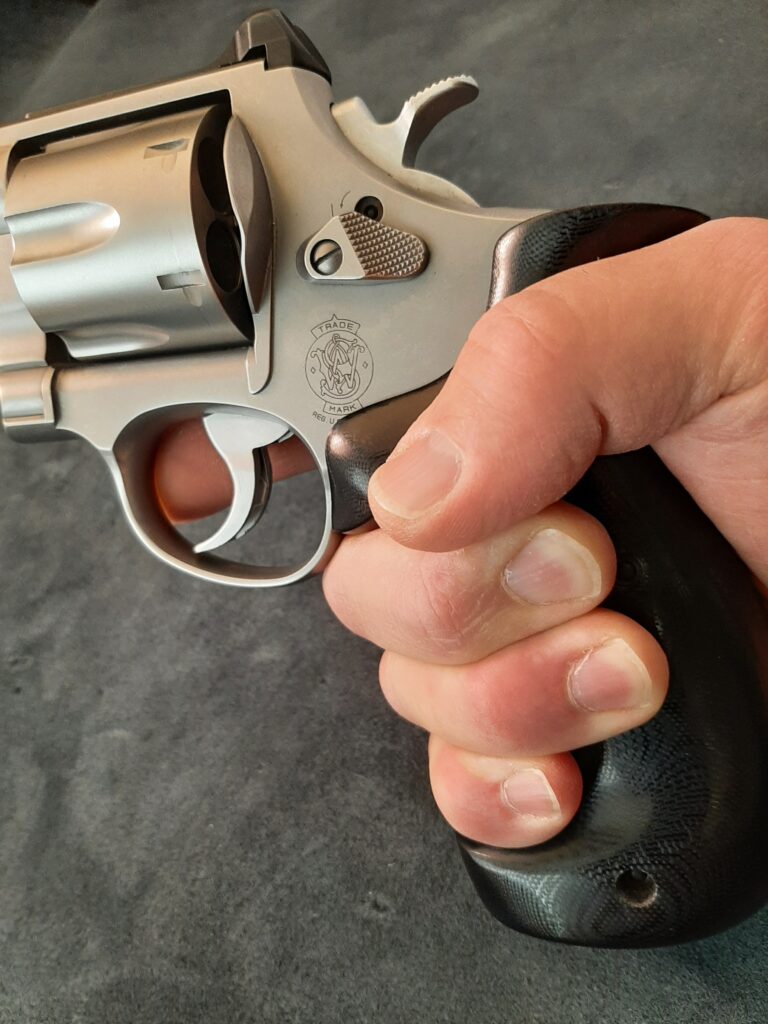
My doubts about the lack of texture disappeared when I grasped them firmly. My shooting hand compressed into the available space on the front strap, between the hand stop and the underside of the frame/trigger guard, and literally locked in place. I must have an average hand, because when I “shook hands” with the grip, my middle knuckles fell exactly in line with the bottom of the trigger guard. Relaxing my grasp allowed the grips to become slippery again-my hand slid off them easily to reload.
Punching the gun out from a ready position brought the sights directly onto chosen targets within the range of my living room. I’d pick a small target, close my eyes, and punch the gun out. Opening my eyes would reveal the sights being on (or very close to) the selected target.
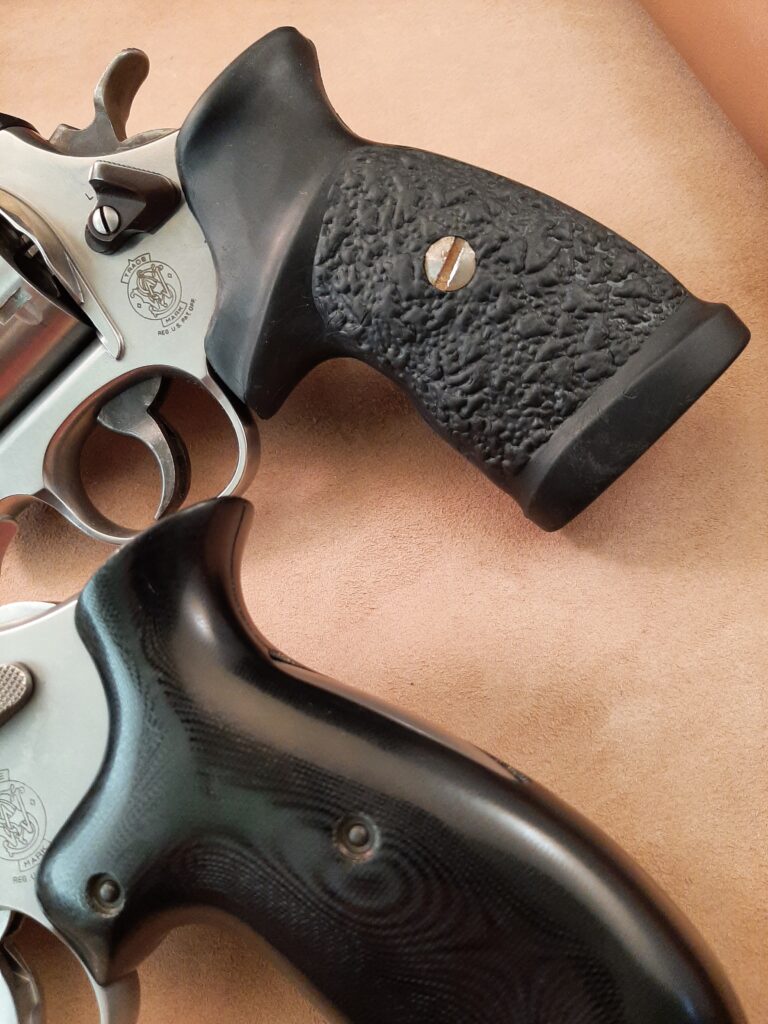
Live fire with the grips confirmed that you don’t need soft rubber to absorb recoil on a revolver. The shape of the PRG Beavertail was perfect for that task, and worked with the hand stop to prevent excessive muzzle flip. It was very rewarding to punch the gun out and be on target- and then have the sights return to target quickly after firing. I found that I could track the front sight in recoil much better than with more conventional grips. I always believed you had to cover the hump on the backstrap of an S&W Revolver with soft material to keep it from hammering the web of your thumb/trigger finger. Dave’s design doesn’t need to be soft, though– it changes the contour of the backstrap’s “interface” with the shooting hand and spreads the recoil force over a larger area.
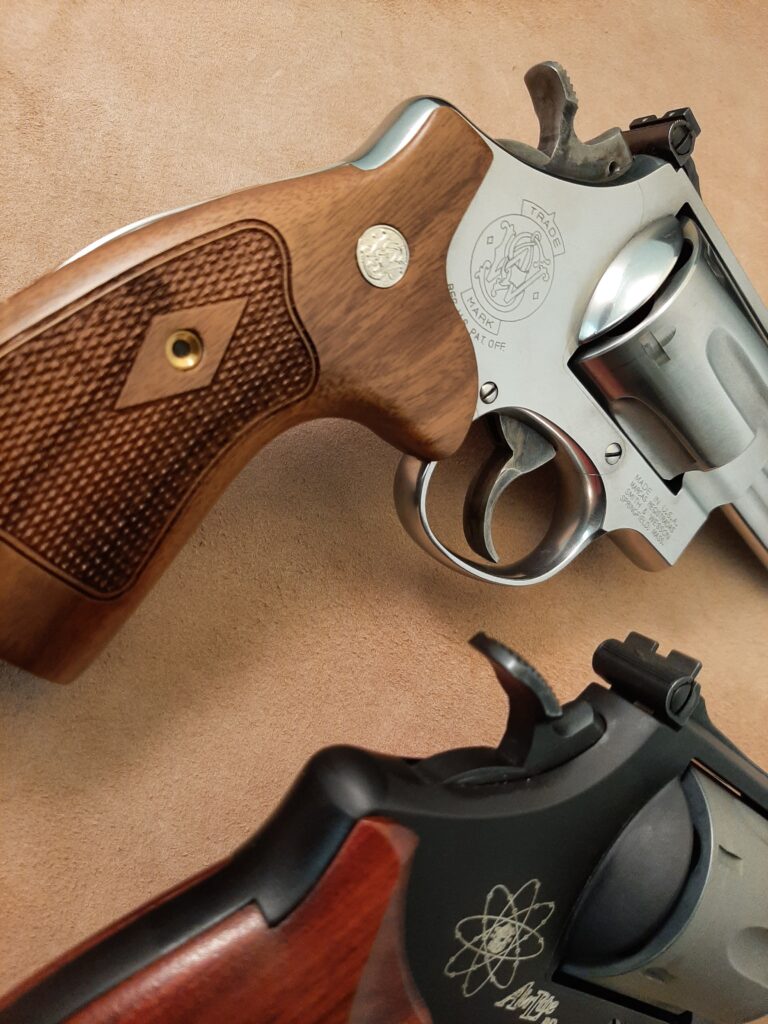
I swapped the grips from the 625 to a .41 Magnum Mountain Gun to see how they did with magnum recoil. I was pleasantly surprised with how well the PRG’s handled factory .41 Magnums. The design keeps the gun from shifting in your hand and the hump on the frame can’t get a running start to beat you up.
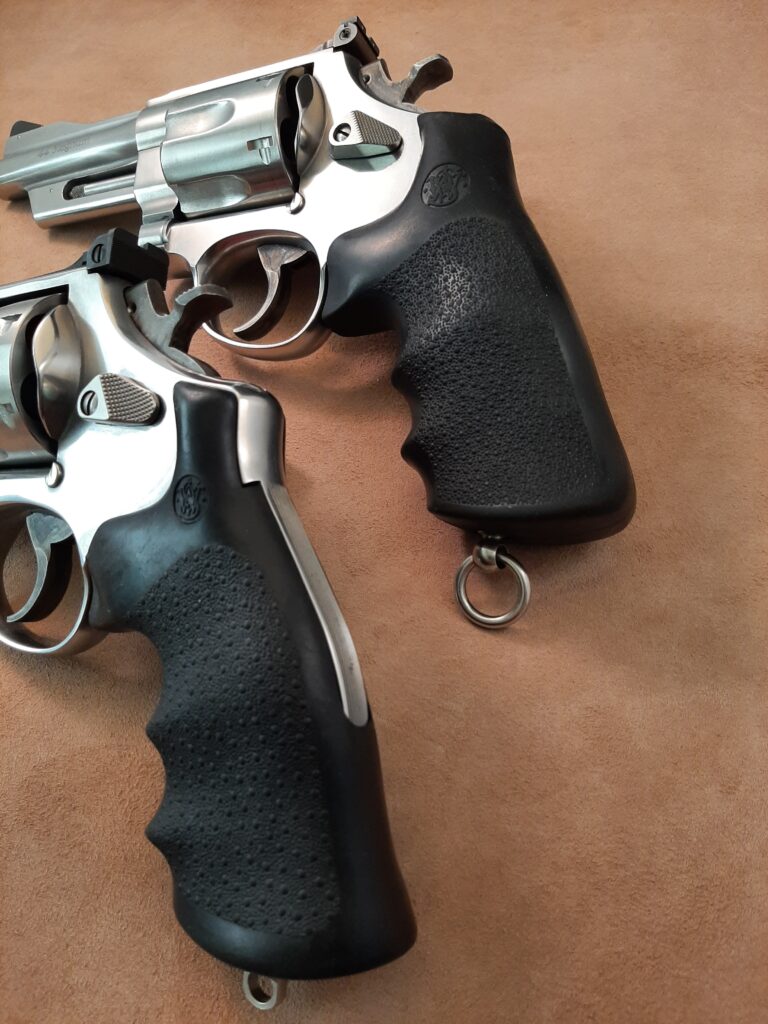
Elmer Keith favored the small, frame-contoured Magna grips, even on his .44 Magnums, because his hands weren’t large. They were strong enough from a lifetime of hard work to prevent the gun from moving. Keith advocated squeezing the sap out of the wood–that kept the frame from cracking him. Lauck’s grips make it easier for the rest of us mortals. Like his sights, you must experience these grips to fully appreciate them. The PRG’s performance may seem like black magic, but it’s simply the result of repeated trial and error—Dave wouldn’t give up until his concept worked as envisioned.
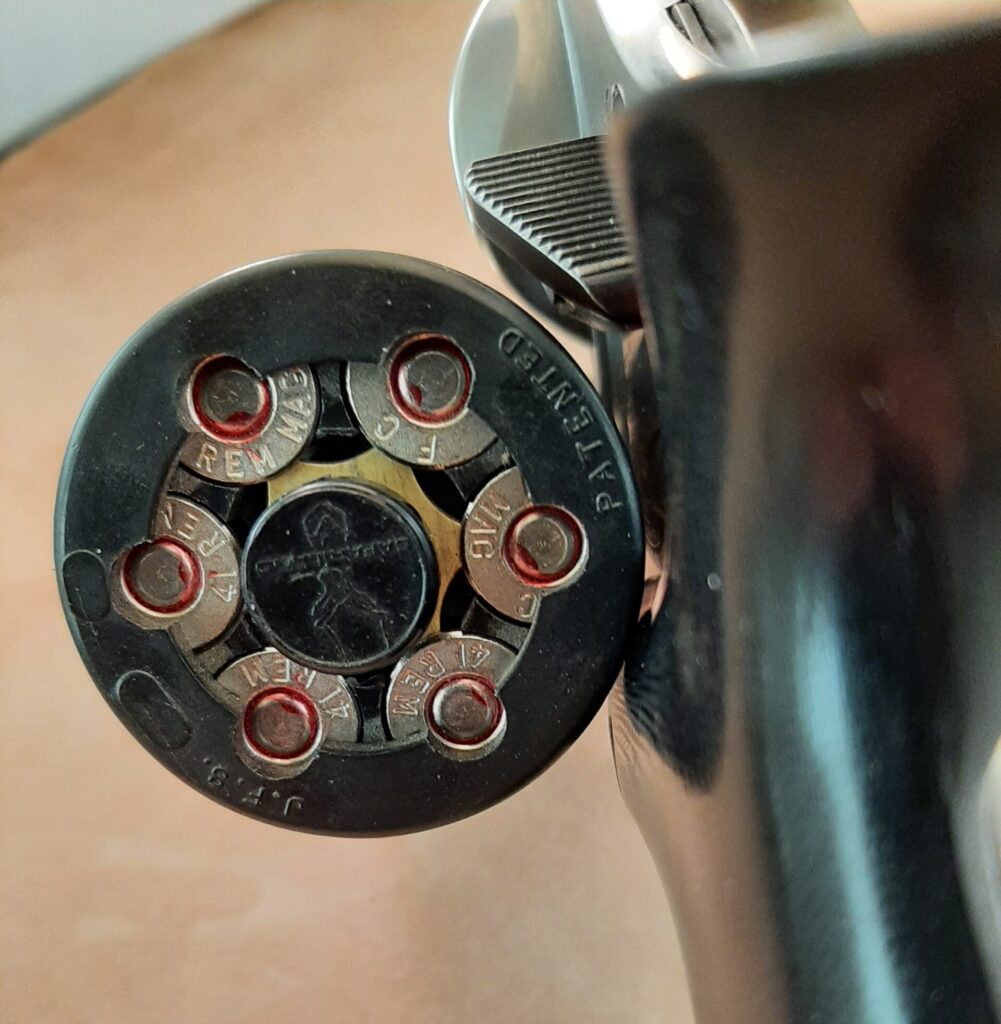
“Sight Pack” Optics Plate
Lauck has also made it much easier for the revolver fancier to mount an optic on full size S&W revolvers. He developed an optics plate that replaces the rear sight assembly on modern S&W K, L, N, and X frame revolvers. The plate (named the Sight Package) typically drops in on newer model guns that have the top strap drilled and tapped underneath the sight. Dave can retrofit them onto older guns as well.
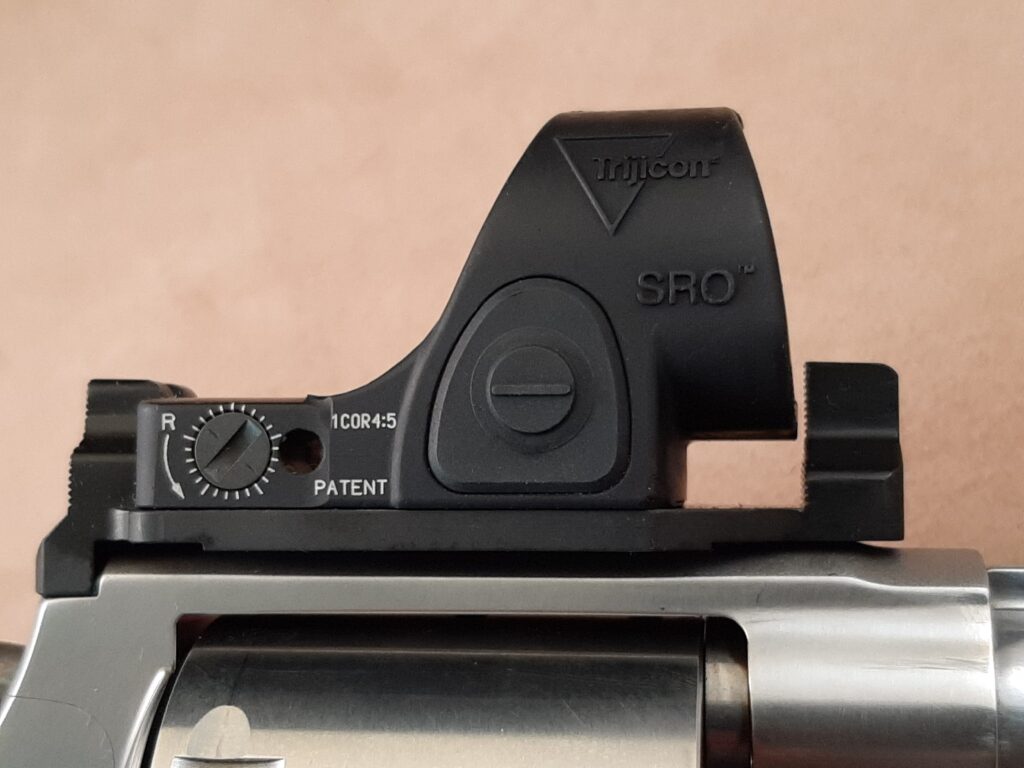
The plate is made to fit Trijicon full size RMR or SRO open emitter red dot optics. It will also work with other optics with the use of adaptors. The D&L Sight Pack isn’t the only plate out there for S&W revolvers, but it’s the only one I know of that has built in iron sights.
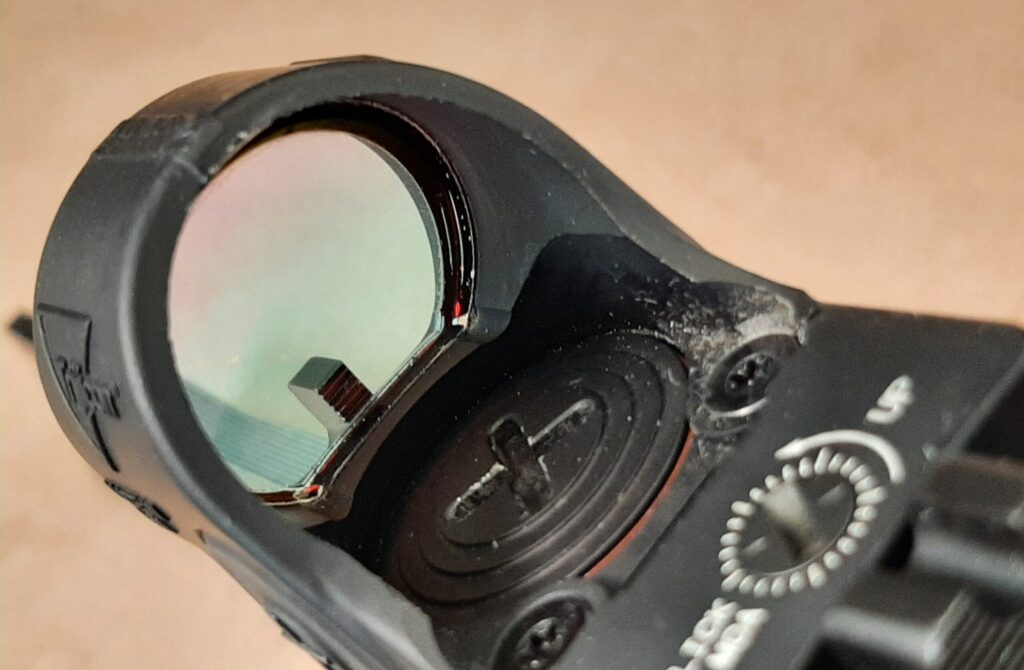
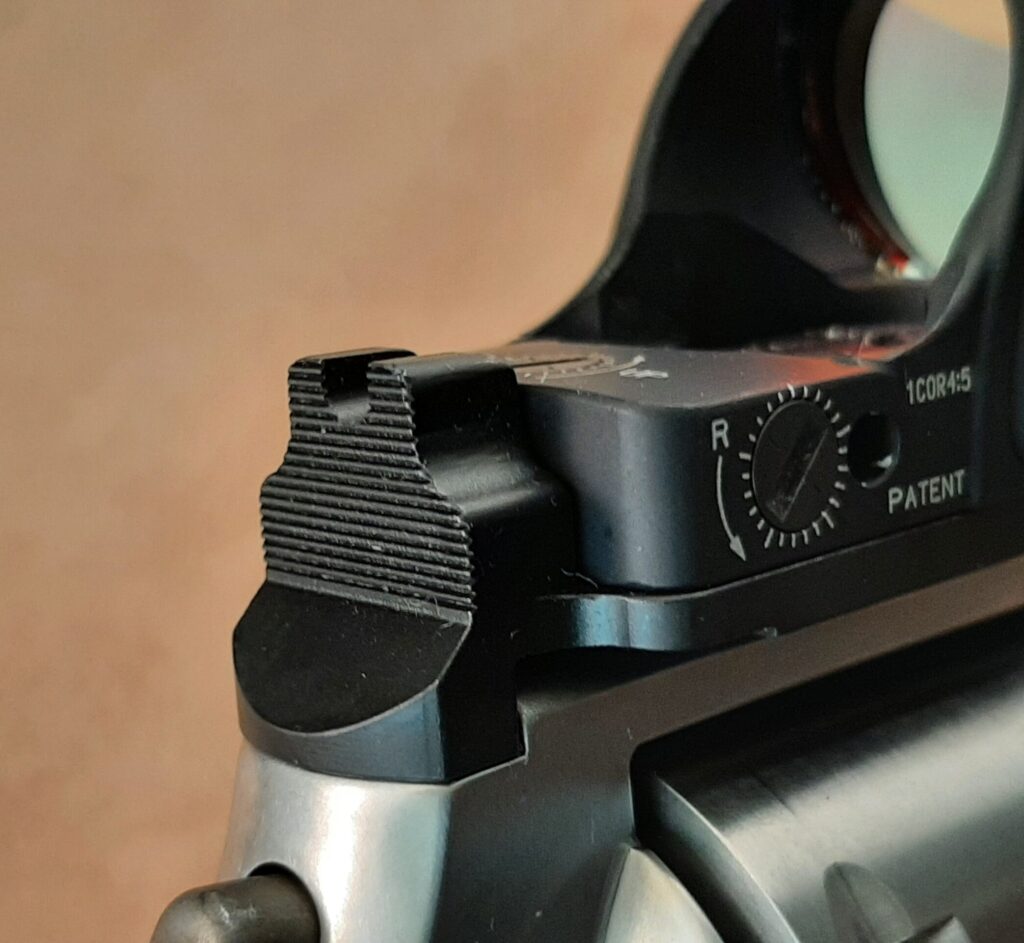
Dave bracketed the optic mounting surface with a rear sight and a front sight that can be viewed through the optic window. In the event the optic fails, the shooter still has short range sights to get them out of a jam.
Testing the Sight Pack
Dave sent one for me to evaluate. Like everything he builds, the mount is rock solid and meant for hard use. I put it on a custom S&W Model 657 as it’s one of the few newer Smiths that I own. The mount slid into the groove with a few taps from a rubber mallet. The mounting holes lined up perfectly with those on the top strap, and the supplied screws locked down without protruding into the cylinder window.
I had ordered a Holosun EPS closed emitter red dot to mount on the revolver. The EPS comes with an adaptor to mount on plates with the Trijicon footprint. It mounted without drama, but the adaptor made it sit a little higher than directly mounting to the plate.
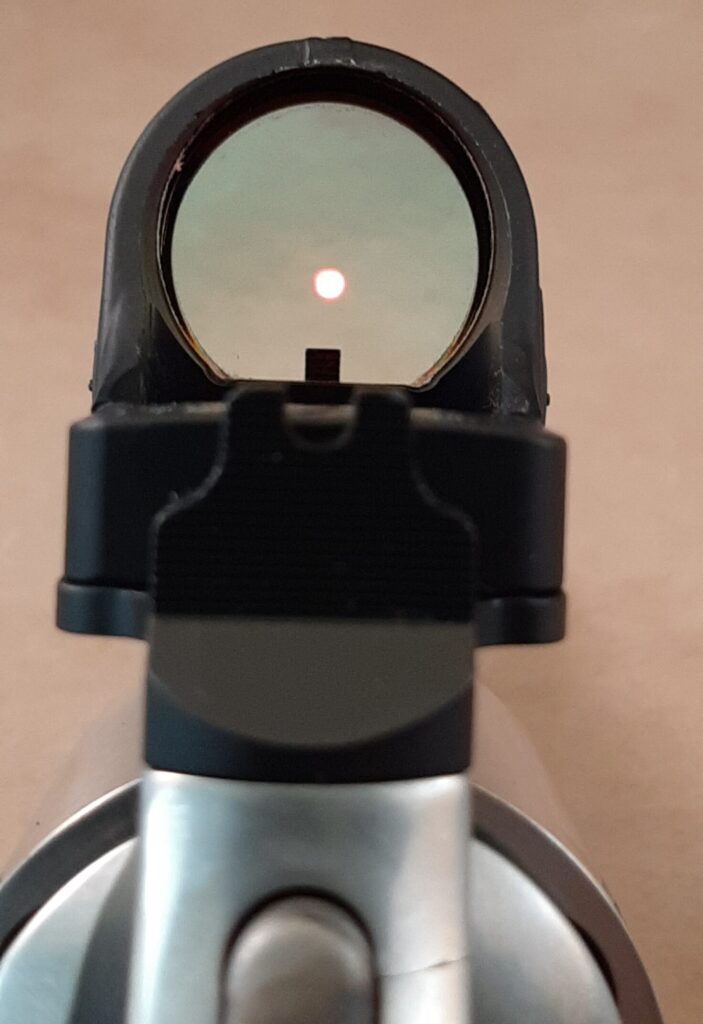
I decided to zero the gun with the Winchester 175 grain Silvertip as an all-around load. Lauck recommends a 7 yard zero with the irons based on their intended emergency use. The wide serrated front post combines nicely with the wide U notch rear for this purpose. The Silvertips impacted about two inches low at 7 yards with a center hold. They would likely be right on with a heavy weight cast bullet for woods use. A few judicious swipes with a file would match impact to the point of aim if the Silvertip was a final choice. The fixed iron sight’s windage was spot on.
Moving on to the optic, I ran out of vertical adjustment before I could achieve a hard zero with Silvertips. It shot a couple of inches high at 15 yards with the elevation dial bottomed out. Lauck said I was the first person he knew of that couldn’t achieve zero with his rail and the EPS. Combined with the adaptor, it sat too high on my 4” tapered barrel .41 Magnum. It obviously works on most other gun and caliber combinations.
I dismounted the Holosun and secured a Trijicon SRO directly onto the D&L plate. This fixed the elevation problem, and a zero was achieved with the Silvertips at 15 yards. I had to dial down the elevation quite a bit from the optic’s previous host, but it zeroed with plenty of downward adjustment left.
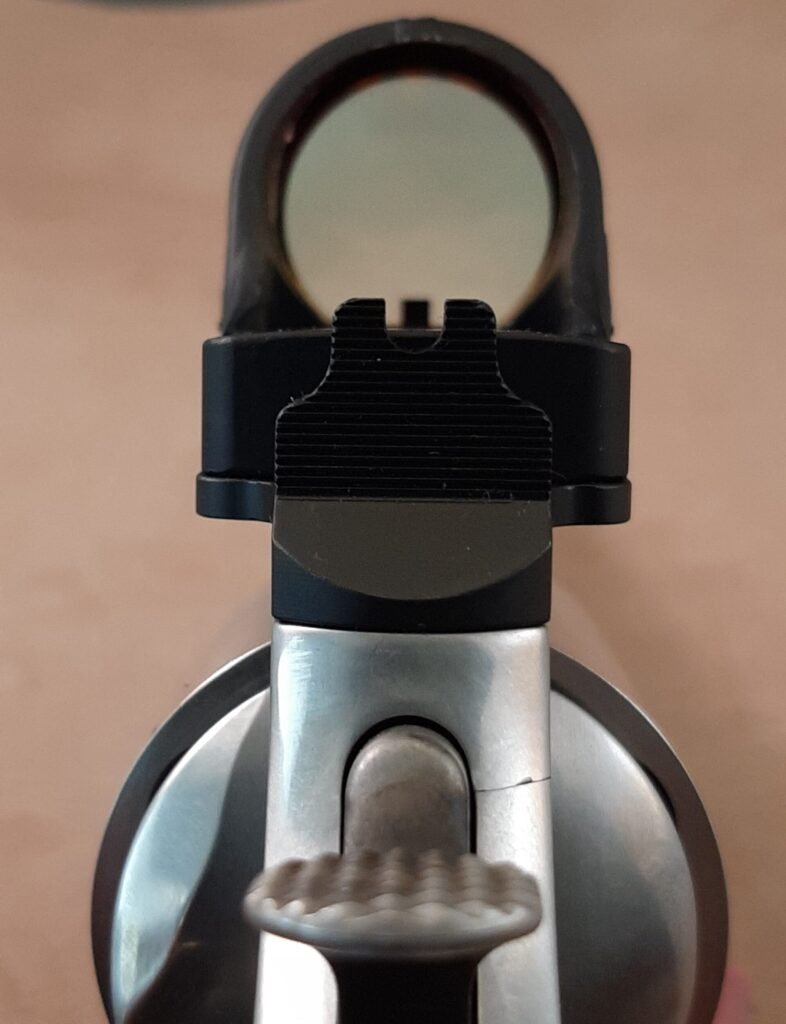
Adding the optic with the D&L Sight Pack to this revolver enhanced its capabilities as a primary hunting revolver. It extends the practical range of engagement and improves sight clarity in low light. These benefits carry over to its usefulness as a defensive gun in the woods or home, and the iron sights are thoughtful insurance when Murphy comes calling.
Summary
Dave combines his decades of shooting expertise with a mastery of machining and gunsmithing skills to produce thoughtful, useful products for the revolvers we love to shoot. If you’re carrying a revolver for serious work, give Dave’s stuff a look.

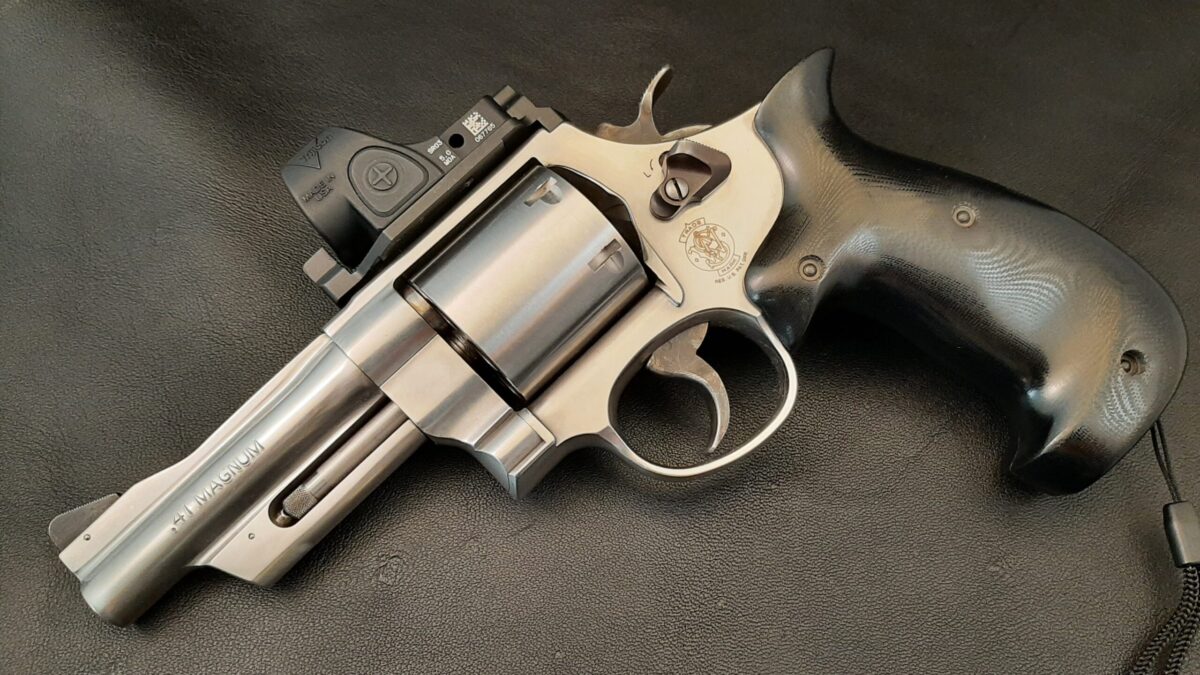
That cylinder latch looks like just the ticket for those of us who shoot left handed and don’t like the angle on the factory offering. Now I just need the grips and sight pack to be offered for the SP101 (or, probably better, find a way to start carrying a K frame.
I think you’re right that the part will be of great help to south paw shooters, Greyson. It gives a wide platform to push off of without being too bulky. It’s a very user-friendly design for right-handed shooters, too. Stepping up size wise to a K frame is definitely a tricky commitment but would no doubt improve your capability. I don’t know if upgrading the SP101 is on Dave’s to-do list yet…
I hope D&L does look into including the SP101 in their line of improvements. Since the (hack, spit!) striker-fired auto has taken over the full-sized carry gun market, most revolvers sold today seem to be SP101s, LCRs, and J-frames for “light duty,” and L-frames (and up?) for hikers and campers who want to meet Yogi and Bullwinkle on semi-equal terms. As a longtime K-frame fan, it makes me sad, but I didn’t make the world.
I hear ya, 1811. It always hurts a little when I hear someone say, “the Glock 17 is the M&P of the 21st Century.”
Old 1811, a good friend and I were lamenting the other day about the 3″ Model 13 being the coolest handgun the FBI ever issued/carried. I’m glad there is still steady interest in the small guns you mentioned (I’d put Taurus and Kimber in that mix, too) and that people still see the value of big revolvers for the woods- but you’re right about K frames.
The older I get the faster my eyes are going to the weenie dogs–D & L’s high-visibility, low-profile rear sights might be the ticket for me.
Spencer, my eyes are headed there too, and I can attest that Dave’s rear sight combined with a good fiber optic front is superior to any other iron sights I have used on a revolver. They improve matters on service sized guns and snubs alike and are money well spent.
Those grips look exciting. Will he put checkering on for customers or do we need to do that ourselves?
Hey Riley, Dave will texture the G10 as needed. Give him a shout and he’ll build them to your specs.
I’ve mentioned before how your comments don’t come up on my computer when I visit your site. I’ve been blaming climate change, but now I’d like to know if anyone else is having the same problem. I’m beginning to wonder if the only way I can see your comments is to make one of my own, so here goes:
Regarding the revolver grip with the beavertail: Looks to me like the beavertail actually forces the shooter’s hand about a quarter to half an inch lower on the stock than it would be with a conventional vertical recoil step. It may give your hand a straighter, more 1911-esque geometry on the trigger, but it would seem that it might exacerbate muzzle rise, especially with full-house Magnums. Is that the case?
The site can be wonky about the comments, I find myself refreshing it every time I open it- it seems to help. The beavertail does keep you from crawling way up on hump of the recoil step (smart terminology, by the way) but I feel like the hand stop cancels that out. At least for me, the sights stayed closer to on target through recoil than with more conventional grips.
Thank you.
The site is built using WordPress and WordPress has started recommending the use of a “persistent object cache”. The idea is that the site will load faster if existing content is read from a saved file instead of re-querying the database. This works okay for some things and less well for others (especially semi-dynamic content like comments). As a user, the best way to deal with this issue is to use control+r to force your browser to request the page be re-read fully rather than using the cached version of the page. For me, this means I click my bookmark for Revolver Guy, press control+r (because I have had new posts not show up in the past), click on any article where I want to view comments, and press control+r again. That works reliably, but requires an extra step on each page.
Thanks Greyson, I appreciate the tutorial for myself and the readers!
Wow, looks like it worked. Before, your comment counter said “6 comments,” but when I scrolled down to the end of the post, it was blank with the “Make a comment” (or whatever, I forgot already)tag. Then I wrote a comment, and immediately all six previous comments popped up. You (or I?) may have created a monster here.
I was wondering if the oversized thumb piece interfered with speedloader use, but your photo showed me that it doesn’t. Thank you.
Looks like D&L Sports is spending time and effort improving the revolver shooting experience for us old wheelgunners, and whippersnappers who are interested in broadening their horizons to embrace the proper ways of doing things. Good on D&L (and the whippersnappers).
Good on D&L and the Whippersnappers, indeed! Dave Lauck is obviously a fan of double action revolvers, and his stuff makes them better. I am really, really impressed with what he is doing for the likes of us (and the whippersnappers).
Hopefully they’ll make these in Braille for when I don’t have my glasses on.
Give Dave a call, S. Bond. He can probably custom make your Braille request; and put low profile lanyard loops on your spectacles! 🙂
Hahaha!
It worked again! I made an inconsequential comment (some might argue that all my comments are inconsequential), and I got the whole comment page instead of the original six that I’ve been getting for most of the week. Now that I can read the page, I’ll try the “control +r” trick that I couldn’t get to before. That is, if I remember it the next time I come here. CRS is a—well, you know.
I’d love to see a rmr mount that’s a little lower so you could just utilize the front sight
Hey Ryan, That would definitely be optimal! Hard to accomplish with the topstrap on most revolvers, though. It would almost be more of a project for the optics folks to put the window on the bottom and the electronics and batteries on the top or the sides of the sight. Maybe there is some R&D going on with revolver makers/optics makers to accomplish that… Let’s hope!
Kevin,
I had the same trouble with the Holosun enclosed sight as you did. I mounted mine on an ancient Model 14 using a very popular low mount for revolvers (name omitted so as not to detract from Mr Lauck’s version). Anyway, I ran out of elevation using the Holosun provides adapter. Adding .020 shim up front brought the POI down to POA, a temp solution.
I started asking around and found out that the holosun MRDS line is machined with a 1 degree down angle in the base to accommodate the lock up angle of popular polymer auto pistols. I’m having a machinist friend mill out that angle on my sight as a permanent solution for revolver applications.
-john
Hey John,
Thank you for sharing that! That is some really good info about the built in angle on the Holosun and the shim and milling solutions. Please keep us posted on how milling it works on revolvers.
Thanks again!
Kevin or Mike,
The Grips described in the article are very interesting. I’ve just started ICORE regularly and the grips might work well for that application. Factory S&W grips aren’t ideal for using speed loaders in classic division. I have to do some whittling on the wood to get sufficient clearance. How much clearance is provide by the grip for Comp 3 and Jet loaders?
Similarly the factory s&W cylinder release needs some whittling on the bottom to make more room for speed loaders or moon clips. How does the new design latch clear Safariland comp 3 and jet loaders?
Hey John, I tested the grips on an N- frame .41 Mag, they cleared with every speedloader I had. A Safariland Comp I, HKS, and a 5 Star. Maybe Mike can chime in on D&L grips on a K or L frame. My suspicion is that they will work with almost any speedloader. I would ask him the same on the D&L Sports Cylinder Release. Dave Lauck has end user’s practical use in mind when he builds his stuff, so I bet his design clears loaders fine…
I know it’s unrealistic and wishful thinking, but I would love to see a gunsmith be able to add adjustable rear sights to a revolver like a GP 100 that has gutter sights. The top mount pic rail featured here appears to be a solution to mount a red dot on top.
Carlos, I’ve seen photos of fixed sight guns that Dave milled to accommodate one of his rear sights, like the Bodyguard and Model 65 in our other article, here:
D&L Sports Sights
If you were interested in a project like that, I’d give him a call, to discuss.